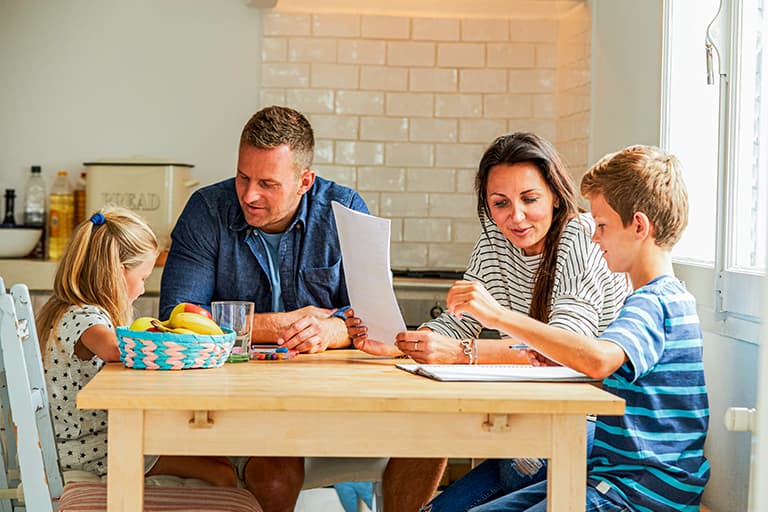This article originally appeared on Mamamia
Most parents who have tried to help their children with homework quickly realise that things can devolve pretty quickly. Even qualified teachers struggle to help their own offspring at home.
The reason is that we think we know our child’s potential, and can get quickly frustrated when things don’t go to plan. Children too, especially the teenage variety, tend to take things quite personally, and can be extremely sensitive to criticism from parents, however well-intentioned. They often close off, put up barriers or just generally behave differently than they would with a teacher (or literally anybody else).
Add to this a heightened level of anxiety about what’s currently happening in the world, how many new Covid-19 cases were diagnosed overnight and, worse, how many deaths, and life at home is looking like a bit of a powder keg. Worst of all, although we’re not technically in lockdown, we’re certainly not doing many of the things which typically support positive mental health, such as going to the gym, connecting with friends and enjoying some time out at our local restaurant or cinema.
In other words, most of us are stuck indoors, worrying about what New Zealand could look like in a mere week, with our sanity savers taken away.
It’s in this completely unprecedented and difficult situation that many parents are suddenly responsible for homeschooling their children, potentially for a prolonged period of time, while trying to manage their own work commitments and keeping themselves calm.
Because this is a train on which you seem to be fastened, it’s best to just begin. Begin with the first steps for making your home learning space as productive as possible and take each day as it comes because you’ll probably find that you’re doing a much better job than you think.
How to structure your online school day
1. Clear a space at home for schoolwork
A dedicated space can make studying at home more productive and enjoyable. Choose an area which is comfortable and free of distractions. This basically rules out the middle of the lounge room (in sight of the TV) or kitchen table among breakfast debris.
The focus needs to be on creating a space where you and your child can comfortably hang out for long periods, even if you’re getting on each other’s nerves.
2. Structure will help them steer clear of holiday mode
If you want to avoid your child treating this period like an early break, it’s important to establish a consistent structure for the day. This doesn’t mean setting 6-8 hours worth of hardcore literacy and numeracy tasks, but it does mean beginning at a consistent time each morning and perhaps observing the regular structure of the school day (work time with recess and lunch breaks in between).
If you’re teaching work sent by your school, perhaps create a timetable with slots for each subject. Breaking things up into manageable chunks and defining one task per slot will help if you’re feeling overwhelmed.
Then again, learning schedules aren’t for everybody. We’ve already seen a significant increase in tutoring support, both from existing and new students. Some parents are coming to Cluey to ensure their child gets 1-2 hours of focused learning each day so that they can be a bit more relaxed about how the rest of the time is spent.
3. Maintain contact with your child’s teacher
Although this may feel like a lonely period, schools are still available for support if you need it. If you have any questions about the supplied content, or if you want to update your child’s teacher on their progress at home, send an email with specific points for response.
Looping back to my earlier point about children often responding differently to others, when your child knows that their teacher is receiving regular progress reports, they might be more willing to keep things on track.
How to keep students engaged in digital learning content
One of the best ways for your child to consolidate their learning is to teach it to someone like you. This will not only show you how much of the online lesson they’ve absorbed, but also give your child a sense of ownership over what they’re doing.
Another way to keep kids engaged is ensure that they’re active participants in their own learning. Help them engage with their content via group chats with their friends and collaborative tasks. Video calls might be a great way for your child to teach others, perhaps grandparents or cousins, and offers the added benefit of helping them feel connected with family and friends during this difficult period.
My best advice is not to put too much pressure on yourself. There are educators who have been very vocal in decrying homeschooling during this period because it’s simply too hard at an already difficult time. If you can manage a few hours of core subjects with your child then you’re doing an amazing job. Give yourself and your child credit for getting through each day and remember to celebrate the small wins — completed modules, productive lessons, the fact that nobody cried that day.
